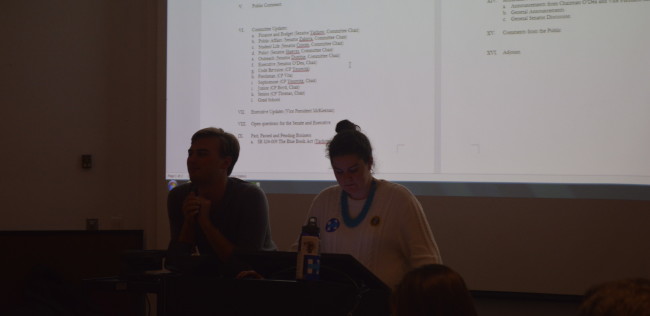On Nov. 8, the Student Assembly senate voted to codify changes to attendance policies that mandate attendance at more events and call for a bill of impeachment upon a senator’s second attendance review. This follows a week where four senators were called under attendance review for three or more absences.
Class of 2017 President Emily Thomas ’17 introduced and sponsored the Attendance Revision Act, which calls for a bill of impeachment upon a senator’s second attendance review. It also mandates that committee meetings, which senators are required to attend on Sundays, be counted as half an absence each.
If a senator is called under a second attendance review, others will vote by a secret ballot whether to impeach him or her. If it passes, all votes will be read out loud on a roll call basis. If the bill does not pass, the senate secretary would record a tally of the “yay” and “nay” votes, but not identify individual voters.
Sen. Gaela Normile ’17 said that one issue with this bill was making sure that all committee meetings were scheduled at set times each week and did not change without warning. She also said that because many senators have busy schedules, it would be better to require at least a week’s warning for schedule changes or extra events with mandatory attendance policies.
“There are a couple of things that aren’t written in the bill that the senate should agree to abide to,” Thomas said. “If you’re a secretary of a committee you send the attendance to Annelise [Yackow ’18] so that she can track it and follow your responsibility as a committee secretary. You should also determine when it is appropriate to move committee times — sometimes it is appropriate and sometimes it is a disservice to everyone.”
“There are a couple of things that aren’t written in the bill that the senate should agree to abide to,” Thomas said. “If you’re a secretary of a committee you send the attendance to Annelise [Yackow ’18] so that she can track it and follow your responsibility as a committee secretary. You should also determine when it is appropriate to move committee times — sometimes it is appropriate and sometimes it is a disservice to everyone.”
Some graduate school senators raised concerns over to parts of this code change: the automatic introduction of a bill of impeachment and the removal of “alternate” senators for graduate school representatives. Sen. Mitch Croom M.A. ’16 said that while he understood that graduate school senators do have to miss more for class-related events, he didn’t think other senators would vote to impeach them.
“I haven’t had to miss yet, but it’s totally conceivable that I might have to a couple of times,” Croom said. “I think the bill is fundamentally okay in its terms and I don’t think anyone in this senate wouldn’t understand or impeach you if you apologize and miss meetings for class.”
After discussion, senators agreed to move forward with the language of the bill without adding a friendly amendment to change the requirements for graduate school senators or to continue to allow for alternate senators.
The idea of impeachment also raised concerns from senators. Sen. Olivia Camper ’17 said that she struggled with the idea of impeachment because senators were elected by their entire class and she thought it was contradictory to have the senate be the only body voting for an impeachment. She recommended other incentives that could be used to enforce commitment.
Class of 2020 President Kelsey Vita ’20 said that an impeachment vote would hold senators accountable to their classes.
“This impeachment vote holds people accountable to the student body that does elect them,” Vita said. “If we don’t show up we’re not doing what the student body elected us to do.”
After discussion, senators voted to pass the Attendance Revision Act by a vote of roll call. Seven senators voted against this bill, but the senate still reached a two-thirds majority to pass it.





























